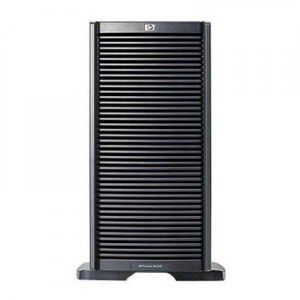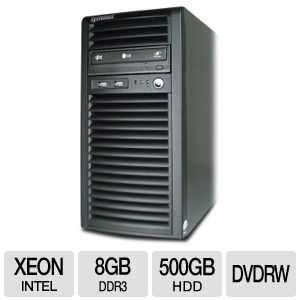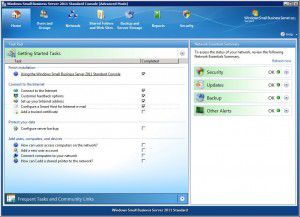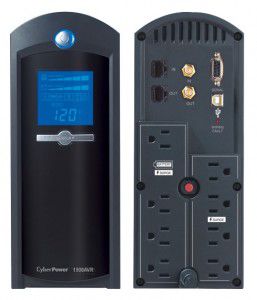Why Our Servers are just Better!
Questions to Ask Before Buying a Server:

- Do you have more than five workstations?
- Are your backup’s dependent upon daily intervention?
- Are your critical Operating System and antivirus updates dependent upon daily intervention?
- Are your critical files located in different locations of your network?
- When you make network changes do you need to do this at each workstation?
- Do you want your files/data to be secure and only accessible to those whom you specify?
Most small businesses with 5 or more employees will face the task of buying a computer server, or adding to their existing inventory. Servers are most commonly used as central file repositories where users can easily share documents, but they can do many other tasks as well–from print and mail serving to performing system-wide backups. Other key applications include hosting databases, running groupware (such as calendar programs and customer relationship management software), and serving a company Web site or intranet. For creative studios or departments, a server might hold large image, video, and music libraries.
 The type of server you choose should reflect the number and type of applications you want to run on it, and the number of users (clients) it will have. Many common applications–such as print serving, sharing office documents like Word and Excel files, and running calendar programs–impose such light processing demands that a single low-cost server may be able to handle your entire company with ease. Other tasks, like hosting large databases or image libraries, require more processing horsepower along with big, fast hard disks and capacious network pipes to match. The type of server you choose should reflect the number and type of applications you want to run on it, and the number of users (clients) it will have. Many common applications–such as print serving, sharing office documents like Word and Excel files, and running calendar programs–impose such light processing demands that a single low-cost server may be able to handle your entire company with ease. Other tasks, like hosting large databases or image libraries, require more processing horsepower along with big, fast hard disks and capacious network pipes to match.
Servers are basically specialized PCs, and they run the gamut of speeds and capacities just as desktop workstations do. Nevertheless, they are a breed apart, designed to be secure (to protect your valuable company data) and fault-tolerant (to be available continuously). Servers also offer remote-management tools, so that an IT person can log in from a desk or workstation and check usage, diagnose problems, and perform routine maintenance such as adding new users or changing passwords.
After determining the functions you need your server(s) to perform, and the number of users you will have, you’ll need to select a server operating system, such as Windows, Linux, or Mac, and choose the hardware to run it on. If you’re upgrading existing servers, you’ll probably want to stick with the same type, for easier migration. For new servers, you’re free to pick the combination of software and hardware that best meets your needs and budget.

You can run a basic server using the built-in file and printer sharing features of plain old Windows XP or Windows 7, plus Remote Desktop for administration over your network. This may suffice if you don’t require hardened security or optimized performance. It is definitely the cheapest way to go for small-group needs because there is no additional cost per client, and it’s as easy to administer as your own PC. You can even repurpose an old PC as a workgroup server–as a simple image server for a graphics department, for example. Similarly, a basic Mac OS X machine can work as an economical file and print server for small mixed networks of Macs and PCs. Mac OS X does a better job of cross-platform support than Windows. But if you need to run PC application software on your server, such as a Microsoft Access database, you’ll have to stick with Windows.
SNECS can tailor systems to your exact circumstances and ensure that your server system grows with your business during the system’s expected life. As a starting point, both your application software (a database or an e-mail server, for example) and your server OS will have recommended system requirements for a given number of users.
Specific considerations include number and type of processors (32- or 64-bit; Intel or AMD), amount of RAM, number of internal drive bays, and server design (tower or rack-mount). For storage servers, you’ll want options such as hardware RAID support and external expand-ability as well.
Benefits of a Server
- Disaster Recovery, Anti-virus, E-mail, User Administration, Data and Network Security can all be centrally managed. This makes network administration easier and thereby less expensive to maintain.
- The server can be the primary backup point. Instead of burning data files on disks, you can quickly move them across the network.
- You gain a higher level of security. By requiring computer users to log in and authenticate on a domain, the server dictates who has access to what.
- You can deploy new software applications more easily through a network. You also can standardize your applications and versions, and make better use of the software you have.
All Servers sold by SNECS, LLC include:

— A 1500VA battery backup and surge protection, with $100,000 connected equipment protection warranty.
— Data cloning software as well as an external hard drive to hold a local backup of software at the business.
— 1 year offsite backup software ($150 per additional year) to prevent data loss (in case of fire, theft, hardware failure, etc…) that resides in a cloud environment.
Solid State Hard Drives for the Operating System Drive to Increase Performance.
Do you need Server Monitoring?
Which Server version is right for you?
It depends:
What features are you looking to use?
How many users do you have?
Do you intend to work from home?
Do you share files between users but want to limit their access?
Do you have software you want everyone to use from one central location?
Depending on the answers to these questions, we can customize a Server for your needs.
We recommend a SNECS technician to come out onsite for a free onsite evaluation. Then we can look at your current computers and Server (if you have one) and make recommendations based off of that. Every server we sell is unique to the business we sell it to.
Every Server quote is custom tailored to each business depending on the software they will be using, the workstations they have, if they will be mostly onsite or remote, and if they plan on expanding in the near future.
|